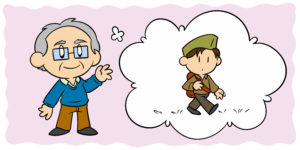Chilean novelist Isabel Allende needs no introduction; the world’s most widely read Spanish-language author, Allende boasts a trophy cabinet full of awards and honors, including the Obama-bestowed Presidential Medal of Freedom. Known for her intensely personal fiction, Allende often blends magical-realist elements with historical narratives and biographical aspects.
Despite her mastery of the craft, she didn’t write her first novel, the wildly successful The House of the Spirits, until she was in her forties, at which point she suddenly found herself a literary star. In many ways a political and social novel, The House of the Spirits is a moving and enthralling inter-generational tale incorporating paranormal and post-colonial elements. Since then, Allende has published twenty-four more books(!), including several memoirs, three YA novels, a short story collection, and a whole load of literary novels.
As you might expect, Allende is a veritable fountain of literary wisdom, and thankfully she’s not been shy about sharing her methods, rituals, and tips. I’ve ordered these tips, each gleaned from Allende’s own words, in the order that they’ll be useful, from thinking of ideas to actually finishing your story, so let’s start at the beginning…
1. Stay vigilant
A vital part of the fiction-writing process that budding authors sometimes struggle with is actually thinking of a compelling story idea in the first place. Allende talks about nagging ideas developing into full-blown obsessions, and she’s not the only author to have experienced this same process; as I’ve mentioned before, Martin Amis calls it the ‘throb.’
There are those of us, however, whose ‘compelling throb’ radars aren’t quite as sensitive. To counter this, Allende suggests staying ever-vigilant during day-to-day life, as you never know when a particular remark in a conversation or a particular detail of a distant skyline will resonate in your head – if you give it the space and attention it needs.
Indeed, the core concept of Allende’s novel The Japanese Lover came to her during an inane conversation with a friend, where the friend mentioned that their Polish mother had befriended a Japanese gardener. Allende, always one to jump to romantic conclusions, decided ‘They must be lovers’ – and lo, The Japanese Lover was born.
2. Don’t be afraid to begin
You can brainstorm ideas, plan, and research until the cows come home, but you’ll be no closer to actually finishing your book until you actually start the thing. The act of starting a new story, especially a novel, can be a harrowing ordeal; it’s easy to agonize over where exactly you should begin, and with which character, and in what timeline. Much easier just to avoid the whole thing altogether!
Allende sees you, self-sabotaging author. Yes, planning can be useful, and it’s important to have done your research if you’re writing, for example, historical or political fiction, but worrying too much about having everything mapped out is likely to harm rather than help your writing process.
Apparently one to lead by example, Allende goes into her books not really knowing what’s going to happen; she has only a loose sense of her protagonist, the original compelling idea, and a setting/time period. The rest unfolds as she goes: it’s only ‘when the characters do things that are unexpected for me,’ she says, that she knows ‘the story has its own courses flowing.’
3. Write every day
An oft-repeated and difficult-to-swallow truth: if you want to get better at something, you have to do it every day (or at least very regularly!) There’s no way around it. When she started writing The House of the Spirits, Allende ‘always had the feeling that the book was like a gift – that it would just fall in my lap like an apple.’ It was only as she continued to write that she realized writing isn’t a case of waiting for inspiration; it’s a case of hard, unglamorous work. If you want to match her success, you’re going to have to put in the hours.
Write. If you want to do sports, you train every day. … Nobody sees the training, nobody cares much about the training, but if you don’t do it, you are not prepared for the competition. … It’s the same as a writer – you have to write every day.
– Isabel Allende
4. Allow yourself to fail
Writers can be a sensitive bunch (especially when they’re first starting out), and understanding that failure is okay can be a difficult lesson to learn. This isn’t helped, of course, by the popular romantic conception of artists and writers as inspiration-struck geniuses. As Allende says in the quotation above, ‘nobody sees the training.’
But failure is a vital part of writing. Allende herself is no stranger to rejection; her first novel was rejected by several Spanish-language publishers before being accepted. But accepting failure is important in the writing process too, not just during the hunt for an ever-elusive publisher. The vital thing is recognizing and learning from your own failure and using it to sharpen your taste and render your eye more discerning. As Allende says, ‘For every good page, you will have written twenty pages that end up in the trash. It doesn’t matter.’
The key here, obviously, is making sure you’re discerning enough to ensure those twenty pages do end up in the trash rather than in your book. You have to be able to tell the diamond from the coal.
5. Find the right word
Interestingly, Allende claims that learning, speaking, and writing in English helped her hone her style. Romance languages such as Spanish, she says, allow for a more flowery way of speaking and writing that simply doesn’t work in English, meaning Allende’s early writing (i.e. before she became fluent in English) is considerably more embellished than her later, more concise prose.
Precise, minimalist prose has been fashionable in English since Hemingway, and Allende found that this trend, combined with the English language’s own linguistic idiosyncrasies, gave her a new appreciation for more spartan, precise expression, particularly regarding the potency of individual words and unadorned nouns.
It’s worth the work to find the precise word that will create a feeling or describe a situation. Use a thesaurus, use your imagination, scratch your head until it comes to you, but find the right word.
– Isabel Allende
She goes as far as saying she has difficulty reading her first novel due to all the adjectives!
6. Keep showing up
Various self-help authors, psychologists, and business thinkers have mused over how long it takes to entrench a new habit or replace an old one, with the early consensus sitting at twenty-one days and more recent science-backed estimations circling a decidedly less optimistic sixty-six days.
Isabel Allende might be able to offer an informed guess, as this next tip concerns the aforementioned ‘putting in the hours’: yes, you’ve got started, you’re chasing an idea, you’re even writing every day. But now you have to keep going until it’s done.
Echoing writers including Zadie Smith and Cheryl Strayed, Allende sweeps the myth of inspiration off the table. You can’t wait around for the muse to bestow her gifts upon you; all you can do is ‘show up, show up, show up, and after a while the muse shows up too.’
Needless to say, this means enduring some miserable days. You might stare at a blinking cursor for hours or wind up throwing everything you wrote away at day’s end. You might question your credentials or even your sanity. But endure you must; for at the end of that long tunnel, a dim light throbs.
There is a moment, a magical moment, at some point, when it gives. And then you don’t need the effort any more. It’s like dancing. When you’re dancing and counting the steps, you’re not dancing. When your body just goes – then you’re dancing.
– Isabel Allende
7. Know when to call it a day
As any artist who’s finished a piece of work knows, tearing yourself away can be the hardest part. Maybe your painting needs just a teensy dab of color over here, or maybe your short story can be tightened up just a tiny bit more…
While such a work ethic is to be commended, you have to know when to stop. If you keep tweaking your latest poem’s line breaks, before long you’ll have lost what was compelling about it to begin with; if you keep dabbing highlights on your painting’s skyline, you’ll detract from its subtlety. In fiction, endless tweaking, editing, and pruning can leave your prose feeling sterile, lifeless, and stiff. Allende agrees:
I correct to the point of exhaustion, and then finally I say I give up. … I’ve learned to avoid over-correcting – when I got my first computer and realized how easy it was to change things ad infinitum, my style became very stiff.
– Isabel Allende
If in doubt, take a page out of Zadie Smith’s book and put your finished piece in a drawer for a few months. Get some distance and then read it through; if you still think corrections are needed, fine, but chances are that you’ll have forgotten the tiny perceived imperfections that seemed to need changing ASAP.
All part of the infinite plan
Isabel Allende remains a potent literary force even in her seventies, and her books continue to wow readers of both commercial and literary fiction as well as critics, filmmakers, and journalists alike. A multi-talented author with journalism, YA fiction, memoirs, long-form nonfiction, short stories, and literary novels under her belt, Allende has something to teach every writer, and her positive, passionate, enterprising attitude is a breath of fresh air in an industry dominated by moody introverts.
So, next time you’re settling down to start a new project, why not keep Allende’s tips in mind? At the very least, you’d be wise to attempt to mimic her indomitable confidence and her startling endurance, which, I think, are directly responsible for her prolific output.
Which is your favorite of Isabel Allende’s books? What lessons have you personally gleaned from her work? Let me know in the comments, and check out 5 Ways Maya Angelou Can Help You Improve Your Writing and 6 Ways Margaret Atwood Can Help You Improve Your Writing for more advice from literary greats.






2 thoughts on “7 Ways Isabel Allende Can Help You Improve Your Writing”
Just finished A Long Petal of the Sea. As with some other Allende novels, it’s epic, spanning decades, continents, and political upheavals. We follow numerous characters and families through the Spanish civil war into exile in Chile, through the horrors and injustices of the Pinochet regime there, exile again in Venezuela, and finally back to Chile and the demise of Pinochet. Flamboyant characters fall in and out of love in various ways, experience dramatic births and deaths and see their fortunes reversed multiple times — all the drama Allende does so well. Among the many people interwoven in the story, two emerge — Roser and Victor — whose lives we track through old age and the end. Roser was a goat herding Catalan girl, rescued and educated as a pianist. Victor is a surgeon, who began his career on the battlefields in Spain. Since the book is not particularly lengthy (336 pages) there is little time devoted to the mundane aspects of their lives, nor to dialogue. I found myself wondering if some “masked observer,” not realizing she was judging an Allende book would criticize the writing for being too much “tell” rather than “show.” Indeed Allende summarizes vast swaths of the lives of her characters and frequently tells us outright what is in their hearts. But, as far as I’m concerned, as a lifelong reader and lover of fiction, it works. Allende is a master story teller. I loved the book, gobbling it down, and couldn’t wait to get back to it when I had to leave to attend to the mundane in my own life. I’d like to hear from other readers who enjoy analyzing the characteristics of good fiction as to the told-not-shown balance in this (or other) Allende writing. Through translations, she has enriched the literature of many languages and provided great insight into her beloved native land.
My absolute favorite novel of Isabel Allende is “The House of Spirits” — what draws me in is the fact that she is the absolute antithesis of Ernest Hemingway. He has held the English language hostage for way too many years. When I read some contemporary American writers, I can almost see them in their Iowa workshop classes criticizing each other’s writing until they all fall in line with what is fashionably acceptable. Hence the uniform voice that editors approve and put out on the shelves for us to read. That elimination of rich biodiversity results in us having farmed salmon for dinner rather than thrillingly wild and savory salmon. American writing since Hemingway is like GMO nutrition in this country — great outlines for fun movies, but no richness of depth to fortify the deep hunger of our souls!